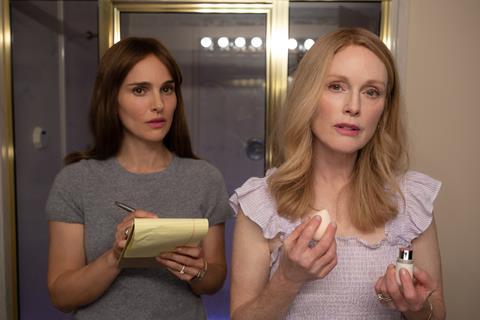Todd Haynes goes south to Georgia for pre-cancel culture drama May December.

One reason that Todd Haynes wanted to tell the story in May December — about the aftermath of an inappropriate adult-minor relationship — was that he knows it would be viewed much differently in today’s climate. “In today’s culture and world, we’re so cocksure about our morals. It’s immediate — you’re in, you’re out, you’re black, you’re white,” says Haynes. “All these agendas have to be confirmed. It’s identity politics. That means it’s such a death of that great muddled anxiety that all the best movies stir up in you — and I mean all the best movies ever made, they don’t have you feeling the same way walking in that you do walking out.”
May December stars Natalie Portman as Elizabeth, a self-absorbed TV actress preparing to play the role of a real-life scandalised woman, Gracie (Julianne Moore), in a new independent film. To get under the skin of the character, Elizabeth travels to the home of Gracie and Joe (her former lover, now her husband, played by Charles Melton) to see what their lives look like 24 years after the scandal broke (back then, she was 36 and he was 13).
Haynes loved that writer Samy Burch’s script — remarkably her first screenplay — situated the story in those decades later, not at the time of their illegal affair. “The barriers and walls have been erected around this family and there is a resistance to confronting the world at large. That gave the Elizabeth character so much more to do, to chip through that.”
It was also important timing for Gracie and Joe because their youngest children are about to graduate high school and head off to university. “Looming over the whole film is not only the 24-year gap [since the scandal broke], but the fact that the kids are about to leave home and leave these two people alone with each other to confront each other. This is going to be a rocky time, with a sense of insecurity and uncertainty.”
Burch’s script had been a buzz project circulating among producers, catching the eye of Killer Films’ Pamela Koffler. At the same time, it had reached Portman’s producing team (she is also a producer on the film).
Haynes first heard about it via Killer Films and Portman in 2020 at the height of the Covid pandemic, when he was stuck at home, finishing his rock documentary The Velvet Underground, wondering what his next fiction project would be. “A lot of scripts were circulating, but this one cut through the noise and made an immediate impression on me,” he recalls. The story touches on themes that Haynes has often explored, including identity and femininity.
He found Portman to be an instant kindred spirit, in their first time working together. “I spoke to Natalie and found in her a partner in terms of what interested her in this story, this disquieting, morally ambiguous story that had you constantly shifting your views about the characters and your judgment of them.” He loved that Portman was excited to explore “people’s projections onto her as Elizabeth, wondering, ‘Is this how Natalie Portman works?’”
Haynes also knew May December could be a great fit for his frequent collaborator Moore to play Gracie. It marks their fifth film together, after Safe, Far From Heaven, Wonderstruck and I’m Not There.

There were many extended phone calls with both actresses to explore the characters. “I talked a lot about it with Natalie, about what was going on inside Gracie and in Joe — what’s the little myth that’s built to protect him or keep him in his place, or to give each of them this fantasy role that they are playing?” says Haynes.
“With Julianne, we talked about Gracie and a princess syndrome — Gracie thinks of herself as a princess who was trapped in the tower of an unhappy domestic life. And the young, swashbuckling knight, with all his virility and youth and glamour, comes to her rescue. This allows each of them to justify the erotic and romantic aspects of that relationship and deny the age difference at the same time and reverse the power dynamics.”
The screenplay was loosely inspired by the real-life scandal of Mary Kay Letourneau, who in 1996 was a 34-year-old teacher who had sex with her 12-year-old pupil Vili Fualaau (and later had his baby before being sentenced to prison; they later married). Moore came up with the idea for her character’s lisp after watching old news footage and interviews with Letourneau.
Haynes is well known as an actor’s director. “The thing about preparing with actors is that it almost always starts with external decision-making,” he explains. “Because you need to make those choices early on — the wigs take months to make. So you can start talking about hair and how the hair will change, and how Natalie’s hair will start to change to look more like Julianne’s hair. And how do we accomplish that? And thinking about the colour palette and things like the pastel, little-girl colours that Gracie wears. So even the lisp was something that was refined early.
“You’re dealing with the external questions first,” he continues, “and then that is giving embodiment to the internal questions. I don’t think I know any actor who doesn’t work to some degree from the outside in. The external protects the internal and gives it a space to come to life. I think that’s true for all of us who make movies.”
Internal questions
One of the key production decisions in the planning stages was moving the setting from Camden, Maine in the script to Tybee Island, near Savannah, Georgia. Haynes had been to Savannah Film Festival a number of times, and thought of Tybee Island (“it’s strange and unique”), just 20 minutes away. And the weather — shooting in late 2022 — had to be right to represent May for school graduation season, which was not possible in Maine at that time of year.
May December — which Netflix released in US cinemas in mid-November and then on its own platform, with Sky Cinema following the same route in the UK — shot in a tight 23 days, and Haynes relished the brisk pace. “I had such an incredibly fun time making this movie,” he says. “Part of me was worried, ‘This film could suck, just because I haven’t had this much fun in such a long time.’”
Next up he is planning a gay romance set in 1930s Los Angeles about an intense relationship between a Native American man and a corrupt policeman (played by Joaquin Phoenix).
Despite the off-screen fun shooting May December, Haynes was surprised that even while praising the film at its Cannes world premiere, some critics said it had a “campy” style, which he thinks can only be explained by the tabloid-ready subject matter — including a memorable seduction scene in a pet shop and a meme-worthy line Gracie delivers about hot dogs at a family BBQ.
“There’s nothing remotely campy about how the film is shot,” says Haynes. “These sustained long takes and this direct address to the lens. All of these stylistic motifs, and the structure of the film, come straight out of European art cinema in my mind. They come out of Bergman and Godard and Claude Chabrol.
“For thematic and narrative reasons, I paid attention to The Graduate or Manhattan — those are comedies that have a restraint of the camera, the sustained shots,” he continues. “I was thinking about withholding and letting the actor exist in the frame. And then we have all these mirror scenes with actors playing directly to the lens of the camera.”
He adds with a laugh: “None of that belongs to the tabloid aesthetic or the TV-movie language.”
























No comments yet